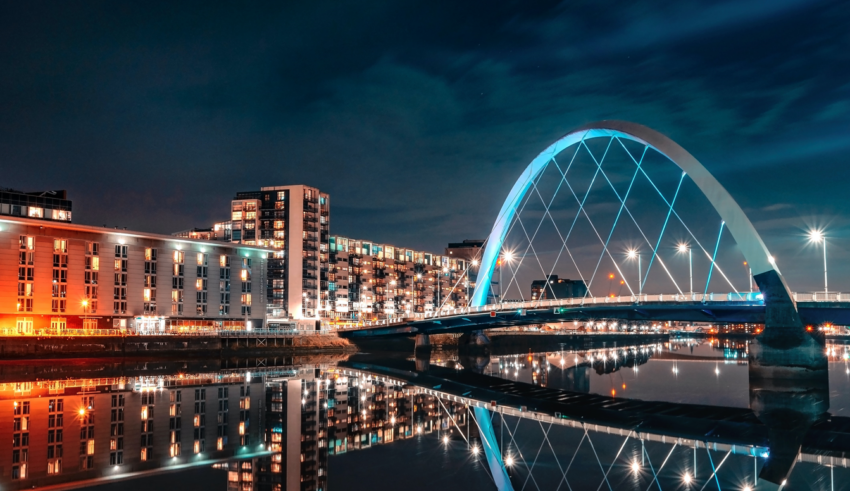PRESS RELEASES | 29/10/2021
Business leaders call on governments to keep 1.5C alive at COP26

Ahead of the COP26 international climate summit, the Aldersgate Group and leaders from business, academia, and civil society are urging world governments to respond to the challenges set by the UK Presidency [1] and seize the opportunity the talks present to deliver a clear pathway towards keeping average temperature increases to within 1.5C.
They emphasised the significant economic opportunity presented by the transition to net zero emissions, called on all major emitters to increase their emission reduction pledges (NDCs) in line with the 1.5C target and called for progress on meeting climate finance pledges to developing countries, phasing out coal, progressing rules for international carbon trading and mobilising international finance towards low-carbon infrastructure.
The IPCC’s recent Sixth Assessment Report [2] delivered a clear message to policymakers, declaring a code red for humanity and stressing the need for immediate action to address the climate crisis. COP26 is a crucial inflection point, and with the right commitments and negotiation progress, it provides a unique opportunity to put the world economy on a clear pathway towards net zero emissions and preventing warming of more than 1.5C.
Although welcome commitments have been made by a growing number of economies such as the United States, Japan, the European Union, and the UK ahead of the talks, further commitments and negotiation progress are needed in several areas.
In particular, it is vital that a growing number of major emitting nations increase the ambition of their NDCs – and put in place credible delivery plans – to put the world economy on a pathway to net zero emissions and towards limiting warming to 1.5C. Urgent progress is also required on delivering the promised $100bn of climate aid promised to developing nations, agreeing a phase out date for coal, finalising a rule book to set up a credible global carbon market under Article 6 of the Paris Agreement, joining up innovation efforts to decarbonise some of the most complex parts of the economy such as heavy industries, and mobilising much larger pools of investment towards low carbon technologies.
Nick Molho, Executive Director of the Aldersgate Group said: “COP26 is a crucial opportunity to show that the international community can build on the Paris Agreement and take another step towards significantly reducing global emissions. The stakes couldn’t be higher, with the IPCC leaving us in no doubt that we have reached a code red for humanity. Businesses now want to see bold commitments and tangible steps from all major emitters to get the world on track for the 1.5C target, prevent the worst impacts from climate change and unleash the low carbon investment the world economy urgently needs to see.
The UK Presidency has demonstrated welcome leadership in the run-up to the summit, through its diplomatic efforts and the release of the UK’s Net Zero Strategy, it’s now time for all major emitters to translate this into success at the summit.”
Henrik Pedersen, CEO, ABP, said: “ABP strongly supports the UK Presidency’s ambitions for COP26. It is essential that governments recognise the critical role that ports around the world play in reducing emissions. As the UK’s leading ports group, ABP is setting the pace in decarbonising our own operations (down 35% since 2014), and we are one of UK’s largest corporate generators of solar energy with 6.5MW. As well as providing strategic locations for the decarbonisation of supply chains, we are helping deliver the UK’s wider climate objective by supporting the offshore wind and renewable energy sectors, and the decarbonisation of industry through the growth of hydrogen and carbon capture and storage technologies.”
Andy Wales, Chief Digital Impact and Sustainability Officer, BT Group, said: “What we need to see now, from both governments and businesses, are clear action plans to deliver pathways to 1.5 degrees Celsius. We urge leaders from around the world to step up in committing to net zero targets. At BT, our path is clear – we have a target to be a net zero emissions business by 2030 for our own operations and 2040 for our supply chain and customer emissions.”
Duncan Price, Global Leader for Sustainability & Climate Change, Buro Happold, said: “The publication of the UN IPCC Sixth Assessment Report, the COP26 climate summit and the associated Race to Zero campaign have shifted the political narrative, catalysing corporate commitments like never before. Now we need the world’s governments to play their part and deliver a clear pathway towards keeping the 1.5C target alive.”
Steve Murrells, CEO of Co-op Group, said: “We all have to recognise that we are in the grip of a climate crisis and need to act accordingly. Put simply, we need to reduce the amount of carbon we put into the atmosphere – and we need to do that now.
We need co-operation at the heart of our collective response if we are to successfully tackle the climate crisis at a global level. I believe it is vital that world leaders seize the moment in Glasgow, and then ensure they legislate, regulate and incentivise when they get home to ensure that all businesses step up.”
From the producers and manufacturers in our global supply chain, to every community we serve here in the UK, the impact of climate change is already being felt, and is only going to be felt more acutely in the years ahead, unless collective action is taken now.”
Iain Patton, CEO, EAUC – the alliance for sustainability leadership in education, said: “As UN Observers at COP26, representing the EAUC Community of over 7000, the EAUC delegation of staff, members, sector leaders and students is in Glasgow to ensure that education is at the heart of climate action! We have been working hard in the run-up to COP26 to ensure that UK and Irish Governments establish policies and funding that will enable universities and colleges to lead on implementable and aggressive emissions reduction policies. We are also working to address climate governance and sustainability in education that students urgently need to create a world with a safer climate.”
Sarah Mukherjee, CEO, IEMA, said: “The history of climate negotiations has been punctuated by the highs and lows of judgements passed on previous conferences. Glasgow must be different. Time is now too short and the stakes too high for COP26 to fail. Yet success is not certain; leaders must now step up if 1.5°C is to remain even an aspirational target and the necessary finances for achieving net zero are to be put place, to avoid a path leading to catastrophic global warming. But leadership must be inclusive, coming from all levels and sectors of business and industry, if Glasgow is to be remembered as the moment the world woke up.”
Peter Jelkeby, Country Retail Manager and Chief Sustainability Officer, IKEA UK & Ireland, said: “Climate change is one of the defining issues of our time and we’re determined to show that it’s good business to be a good business. At IKEA we want to show that healthy and sustainable living can be affordable, attractive and convenient for the many. Today, we are already supporting our customers to live more sustainable lifestyles, whilst helping to create the circular economy that we’ll need to transition to net-zero. We are proud to be a Partner of COP26 and will work closely and collaboratively with the UK Government and other partners to seize this opportunity for ambitious climate action and with world leaders gathered together, this is a historic opportunity to turn the tide on climate change.”
Alyssa Gilbert, Director of Policy and Translation, Grantham Institute – Climate change and the environment, Imperial College London, said: “We call for governments to commit to ambitious greenhouse gas reduction targets, adaptation plans and a strong climate finance package to drive the essential short and medium-term action needed on climate change. These international signals and roadmaps create the momentum and expectations for the future that will allow the strategies and actions that business, nations and civil society are trying to implement to thrive. Sitting in a university, we want our knowledge and innovations to be implemented and scaled up around the world, driven by these global signals.”
Sam French, Business Development Director, Johnson Matthey, said: “It is crucial that world leaders show clear ambition and adopt bold commitments on the key priority areas outlined for COP26. A positive outcome at the summit will provide businesses with further confidence to continue their investment in the innovative technologies needed to reach net zero. At Johnson Matthey we have seen first-hand the economic opportunities associated with the energy transition, through schemes like the HyNet industrial cluster in the North West of England, where industry will be powered by hydrogen.”
Simon Virley, Vice Chair and Head of Energy & Natural Resources, KPMG UK, said: “COP26 must keep alive the Paris Agreement goal of limiting global warming to 1.5 degrees. The effects of climate change are already evident around the world, even with 1 degree warming on pre-industrial levels. At KPMG, we are doing our bit with a global commitment to reach Net Zero by 2030, and helping our clients navigate the risks and seize the opportunities created by the energy transition.”
Nigel Wilson, Group CEO, Legal & General, said: “Climate is not only the most urgent issue but also the biggest investment opportunity of our lifetimes. We can harness the power of business and markets to make sure that the transition happens. We must all now move from promises and commitments to action and delivery. Our roadmap to net zero focuses on funding the transition to support a low carbon future and deliver secure returns. We are investing in renewable energy, and we have actionable climate plans in place across our major business areas including investments, housing, and commercial property.”
Phil Bentley, Chief Executive Officer, Mitie, said: “The UK continues to lead the way globally in driving decarbonisation across both the public and private sectors. However, if we are going to meet the stretching targets needed to limit the impact of global warming, we all need to go even further, and faster, and make net zero a reality. With COP26 in a matter of days, we all need to take responsibility. Now is the time for Governments from across the world and industry to work together to take even bolder action.”
Duncan Burt, Chief Sustainability Officer, National Grid, said: “We want to hear strong alignment from the major economies including the US, China, the EU and wider G20 on the pace of change and action being taken during this decade to cut carbon emissions. That means a faster transition to electric vehicles, an end to burning coal, investing in renewable energy and financial support to help nations tackle the impacts of climate change.”
Stefano Agostini, CEO, Nestlé UK&I, said: “The window of opportunity to take action is closing. Collective global ambition and commitment are urgently needed if we are to limit climate change below 1.5 degrees of warming and avoid dangerous and irreversible tipping points. As a food and drink business operating in 187 countries globally, we need bold commitments from governments that chart a course towards achieving this so that we too can meet our goal of reaching net zero by 2050 and halving our emissions by 2030. COP26 is therefore an incredibly important moment for us and for society. Together, with clear ambition, clear action and courageous collaborations we can make this a good COP that we can look back on with pride.’
Larissa Kennedy, President, NUS, said: “Improving the ambition of Nationally Determined Contributions isn’t the real challenge at COP26. Our real challenge is getting political leaders to honestly and urgently deliver the rapid carbon reductions and climate aid they have already pledged. Young people are tired of broken promises. My generation will never forgive them if they continue to fail to deliver.”
Philippa Spence, Managing Director, Ramboll UK, said: “Now is the time global leaders have to be bold. Going into COP there is no doubt as to the weight of responsibility they are carrying. As an industry we urge them to make the hard, but necessary decisions to deliver their NDC’s in line with the 1.5C target, do the just thing for developing nations to support their transition and finalise the Paris rulebook.”
Beccy Speight, Chief Executive, RSPB, said: “We are in midst of a nature and climate emergency, our wildlife and wild spaces are under threat at a time when nature-based solutions should be part of our response to climate change. As well as helping carbon sequestration, investing in nature can also lead to the creation of new jobs; cleaner water, air, and healthier soil; better and more resilient protection against the impacts of climate change such as flooding and drought; and benefits to our mental and physical health whilst simultaneously restoring the wildlife we love. In short, we can revive our world, we can leave a positive legacy for the next generation.
As hosts of the summit, the UK must ensure that COP26 is remembered as a moment when the world not only kept the goal of limiting temperature rises to 1.5 degrees of warming alive, but also set the agenda for how commitments will be backed with financed actions, including for nature.”
Carl Ennis, CEO, Siemens plc, said: “Climate change is a global issue that needs to be addressed locally. Many of the technological solutions to Net Zero are already available, but more needs to be done to deliver them at scale. Governments, local leaders, industry and investors must work together to unlock the finance needed to accelerate change.”
John Scanlon, Chief Executive Officer, SUEZ recycling and recovery UK, said: “The circular economy, resource efficiency and sustainable waste management are notable by their absence on the COP26 agenda but with resource use driving half of the world’s climate emissions, they represent a significant opportunity for governments to up the ambition of their emission reduction pledges and move towards one world living.”
Maria Connolly, Head of Clean Energy and Real Estate and Executive Board Member Responsible for Sustainability, TLT LLP, said: “COP26 is no time for half measures. The agreements and policies coming out of this summit need to be as bold as they are effective at keeping average temperature increases to within 1.5C. In fact, major organisations are begging governments to impose more stringent climate rules on the business sector, and businesses urgently require greater clarity and incentives to steer the corporate ship away from carbon emitting practices and more quickly in the direction of a greener future. This is the right thing to do, and it makes great economic sense. It is time for the world’s leaders and negotiators to get specific about the path to net zero, and serious about the 1.5C target.”
Simon McWhirter, Director of Communications, Policy and Places, UKGBC, said: “Limiting global temperature rise to 1.5 degrees is a non-negotiable, and although it’s sometimes seen as a hackneyed phrase, we are truly now at a critical tipping point; one when world leaders must seize the opportunity to set and protect the 1.5 degree pathway. The built environment is a major contributor to global emissions and our buildings – and the communities that live and work in and around them – will be especially vulnerable to the catastrophic consequences of climate change if we do not act decisively. We already have many of the solutions required to build better now, and our sector stands ready to play its part. We are therefore calling on world leaders to set out ambitious plans and start the action to accelerate the capacity of our industry to deliver, through ambitious green finance mechanisms, standards and global net zero commitments. Ambition is critical but plans and action are even more so.”
Mary Thorogood, Director, Head of Public Affairs Northern and Central Europe MarCom, Sustainability & Public Affairs, Vestas, said: “At COP26 next week in Glasgow, governments around the world must move from talk to action in order to achieve the goals they’ve signed up for as part of the Paris Agreement. Through the drastic scale up of renewable technologies like wind energy, let’s decarbonise all sectors of the global energy system and scale up, now!”
Rick Willmott, Group Chief Executive, Willmott Dixon, said: “The built environment sector contributes 39% of global carbon emissions. Last year we announced what we believe are the construction industry’s most ambitious sustainability targets to 2030 because we see that putting net zero and green growth at the heart of our business is core to our continued development and success. Around 350,000 new roles in construction alone could be created by putting the UK on track for net zero emissions by 2050. We urge both world economies and large companies to join us in committing to a net zero transition pathway aligned to 1.5C.”


